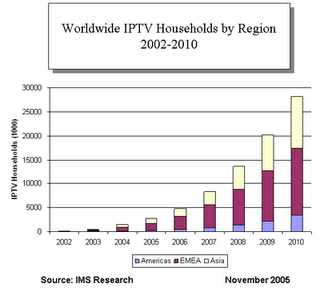
Despite tight content restrictions, dueling government agencies and an outdated telecom and cable infrastructure badly in need of an overhaul, the world's largest TV market stands poised to become the world's largest IPTV market over the next few years. China, by far the global leader with an estimated 355 million to 380 million TV households and at least 105 million cable subscribers should also become the global leader in IPTV homes by the end of the decade. Because the installed base of TVs is so much higher than that of PCs in China, IPTV services such as TV Gaming and TV Education may help drive Chinese families toward widespread use of IPTV. An additional finding indicates that the Olympic Games being held in China in 2008 may also contribute to substantial growth in IPTV services during the forecast period.
Many major hurdles must still be overcome, however, before the IPTV business can blossom in China. The biggest obstacles include impending launch of DTT, uncertain and conflicting government regulatory policies, tight content controls, an immature broadband infrastructure, the huge cost of massive plant upgrades, low broadband penetration, and high prices in a complex, confusing market.
Due to all these factors, experts' forecasts about the growth of the market range all over the map. It ranges from 4.2 (Source: Kagan) to 18.2 million (Source: In-Stat) IPTV subscribers by 2010. Nevertheless, everybody agrees that China should become the biggest IPTV market on the planet in four years' time, if for no other reason than the huge size of the nation itself.
Major hurdle is government's reluctance to issue more than a handful of IPTV test licenses to the nation's two major telecom firms, China Netcom and China Telecom. Under those test licenses, China Netcom has launched capped market trials in such northern regions as Harbin Province, while China Telecom has rolled out trial IPTV services in such southern areas as Shanghai. Moreover the strict video programming restrictions that the government's powerful State Administration of Radio, Film and Television (SARFT) has imposed on phone companies, cable operators, satellite TV providers and broadcasters alike, particularly concerning the use of foreign content. For instance, SARFT has mandated that no more than 40% of the animation shown on Chinese TV can be produced outside the country.
A compelling service needs compelling content but will China be prepared to relax its foreign content laws to allow IPTV providers to offer a differentiated product? It seems unlikely in the foreseeable future. The only problem with China is that it's a gated gold mine.
No comments:
Post a Comment